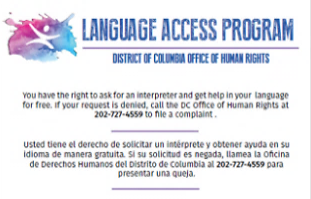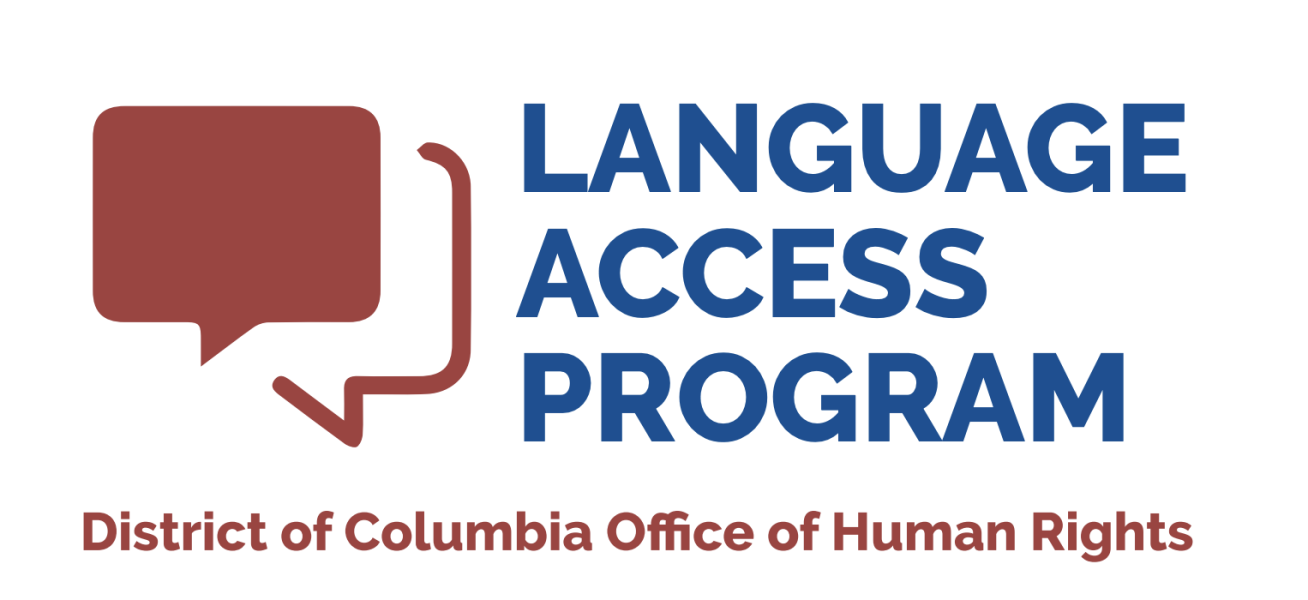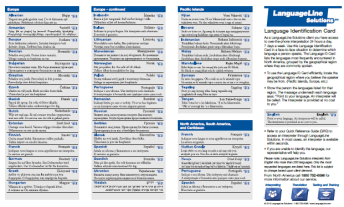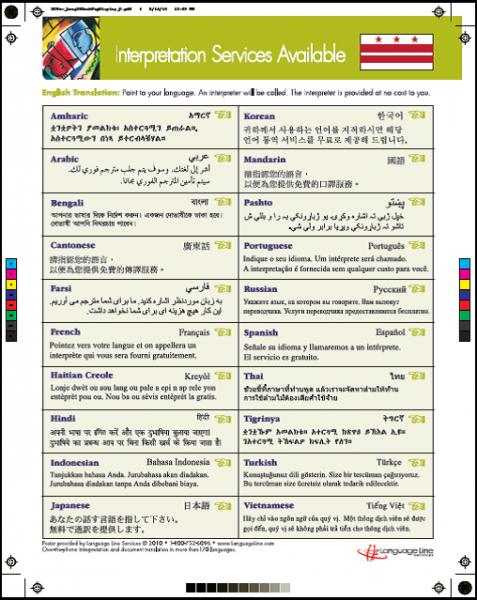In this Section:
Compliance requirements • Language Access Coordinator • Data collection • Translation • Interpretation • Training • Signage • Outreach • Biennial Language Access Plan • Contractors and grantees • Compliance monitoring • Enforcement
Compliance Requirements
The goal of the Language Access Act of 2004 is to ensure that limited and non-English proficient (LEP/NEP) customers can obtain government benefits that are equivalent to what English speakers receive. It articulates requirements that covered entities with major public contact must fulfill in order to meet this goal. To comply with the Language Access Act, covered entities with major public contact must:
- Identify a Language Access Coordinator;
- Collect and analyze data on the demand for entity services in languages other than English;
- Translate and distribute vital documents;
- Offer interpretation services;
- Train staff on legal obligations;
- Post language access signage;
- Conduct outreach; and
- Establish and implement a Biennial Language Access Plan.
Covered entities with major public contact are also responsible for ensuring that their grantees and contractors meet these requirements. In the sections below, you can find more information on each requirement, as well as appropriate resources. View the consolidated list of resources.
Covered entities with major public contact are also required to develop and implement and Multilingual Phone System. View the guide here.
Language Access Coordinator
Under the Language Access Act of 2004, covered entities with major public contact must designate an employee to coordinate language access information and activities: the Language Access Coordinator (LAC). The LAC reports straight to the agency director or to another official designated by the director, and is in charge of organizing and supervising all agency activities undertaken to comply with the Act.
Accordingly, the LAC’s scope of work may include identifying data collection mechanisms, maintaining a record of vital documents, recruiting bilingual staff members to serve as agency interpreters, developing an outreach strategy, and disseminating resources among personnel. The Act specifically notes that the LAC is responsible for tracking budgetary issues related to language access services, as well as reporting every quarter on the BLAP’s status to the Language Access Director at the Office of Human Rights. The Act also tasks the LAC with receiving reports of alleged language access violations, and relaying these reports promptly to the Language Access Director.
As distributors of information on language access resources, LACs are responsible for providing the employees at their covered entities with a language access policy. This policy should reflect the requirements of the Language Access Act as they relate specifically to your agency, department, or program. The Office of Human Rights has developed a policy template for covered entities with major public contact. Feel free to amend the policy below as applicable to your agency.
To view the list of LAC, please click here (updated February 16, 2024).
Language Access Policies
While the D.C. Municipal Regulations and D.C. Register present the exact requirements for Language Access in the District, they are written in general terms. Employees at your agency may find it helpful to have a policy that is specific to their operations. For this reason, the Office of Human Rights has developed a Language Access Policy template for covered entities with major public contact. Feel free to amend the policy below as applicable to your agency.
Download a language access policy template for covered entities with major public contact (PDF).
Data collection
Covered entities with major public contact are responsible for tracking their encounters with LEP/NEP customers. Your existing databases, applications, and tracking systems must be updated to contain fields that will capture what languages you encounter and how many of your customers speak each language. This information will help the District discern patterns regarding the language needs of its residents, workers, and visitors. The data you collect is also the foundation for determining your threshold languages. Threshold languages are non-English languages that your covered entity encounters frequently because they are spoken by a certain number of your LEP/NEP constituents (this number varies from entity to entity). Threshold languages contribute to the process of determining translation priorities, because the Language Access Act stipulates that covered entities must make vital documents available in all of their threshold languages.
Download a guide to data collection (PDF).
What is the threshold number for my covered entity?
Every covered entity with major public contact has two possible threshold numbers: either 3% of the total constituent population or 500. The actual number is the lesser of the two. To determine the threshold number for your covered entity, calculate how many individuals make up 3% of your constituent population and compare it to 500. If the number of individuals that make up 3% of your constituent population is less than 500, then that is your threshold number. If it is greater than 500, then your threshold number is 500.
DC demographics
As the nation’s capital, the District of Columbia is a hub for immigration. Many of our constituents are foreign-born, and they come from countries all around the world. As a result, covered entities with major public contact encounter a wide variety of languages, with the top six being Amharic, Chinese, French, Korean, Spanish, and Vietnamese. For more information on the District’s diversity, check out the following resources:
Translation
Under the Language Access Act, covered entities with major public contact must provide translations of their vital documents, which are written materials intended for the public. A document is considered vital if it contains information that is critical to accessing your covered entity’s services, or if conveying the information is required by law. Vital documents may be in either electronic or print form.
What kind of document is considered vital?
Vital documents include, but are not limited to:
- Complaint, consent, release, or waiver forms;
- Claim, application, or enrollment forms;
- Letters or notices pertaining to the reduction, denial, or termination of services, programs, or benefits, or that require a response from the customer;
- Time-sensitive communications, such as notices of deadlines related to hearings, investigations, or litigation;
- Notices of disciplinary action;
- Notices of rights, requirements, or responsibilities; and
- Notices regarding the availability of free language assistance services.
What languages do vital documents need to be translated into?
 A covered entity with major public contact must provide vital document translations in all of its threshold languages (i.e., languages that are spoken by 3% of the total constituent population or 500 individuals, whichever is less – see “Data collection” for more information). Covered entities must also ensure that these translations are as widely available to the public as the English versions are. If a vital document is posted online in English, then its translations must also be provided online. The same goes for hard copies; if your reception area displays vital documents in English, then the translations should be there too. Employees should know where to find the translations of any vital documents that they provide to constituents.
A covered entity with major public contact must provide vital document translations in all of its threshold languages (i.e., languages that are spoken by 3% of the total constituent population or 500 individuals, whichever is less – see “Data collection” for more information). Covered entities must also ensure that these translations are as widely available to the public as the English versions are. If a vital document is posted online in English, then its translations must also be provided online. The same goes for hard copies; if your reception area displays vital documents in English, then the translations should be there too. Employees should know where to find the translations of any vital documents that they provide to constituents.
Multilingual taglines
Even though covered entities are not required to translate documents with non-critical information, it is best practice to make such documents LEP/NEP-accessible as well. One way of doing so is to prepare written communications with standard, multilingual taglines that indicate how constituents can request assistance in their primary language. The Office of Human Rights has translated the sample taglines below into the most common languages found in the District: Amharic, Chinese, French, Korean, Spanish, and Vietnamese. Feel free to use these templates for your written communications.
Multilingual taglines, version 1: HELP IN YOUR LANGUAGE
If you need help in your language, please call __________ for free interpreter assistance.
Taglines version 1 - “Help in your language”
Multilingual taglines, version 2: IMPORTANT NOTICE
This document contains important information. If you need help or have any questions about this notice, please call _______________. Tell the customer service representative the language you speak so you can be provided with an interpreter at no cost to you. Thank you.
Taglines version 2 - “Important notice”
Covered entities with major public contact are expected to pay for their own vital document translations, and may contract with any vendor that provides accurate services. However, the government of DC has contracted with several vetted vendors to provide city-wide rates for translation.
Download a list of approved vendors for translation services (PDF).
Download a guide on reviewing translations from Comprehensive Language Center, Inc (PDF).
Interpretation
All covered entities with major public contact must be prepared to provide interpretation for LEP/NEP customers who request or demonstrate a need for assistance. Interpretation is the official term for the process of converting what someone says out loud from one language to another. Although the public and media often use the term interchangeably with “translation,” the word “interpretation” refers to oral speech and “translation” refers to written texts.
Download this guide to find out more about types of interpretation (PDF).
Download tips on communicating with LEP/NEP persons (PDF).
Covered entities with major public contact must offer interpretation during all LEP/NEP encounters, whether in-person or over the phone. Covered entities have three options for providing interpretation services to LEP/NEP constituents:
- Refer the constituent to a bilingual staff member (if one is available);
- Hire an in-person interpreter (for anticipated interpretation needs, such as at a public hearing or scheduled meeting); or
- Call the District’s contracted telephonic interpretation service.
Covered entities with major public contact are expected to pay for their own interpretation, and may contract with any vendor that provides accurate services. However, the government of DC has contracted with several vetted vendors to provide city-wide rates for in-person and telephonic interpretation.
Download a list of approved vendors for in-person interpretation services (PDF).
Telephonic interpretation via LanguageLine Solutions
The Language Access Act of 2004 requires all covered entities with major public contact to maintain a current account with a multilingual telephonic interpretation service. This service enables District staff to provide immediate interpretation services to LEP/NEP customers. The city’s contracted telephonic interpretation vendor is LanguageLine Solutions (LLS). You should call LLS for interpretation if no bilingual staff members are available to assist a customer who is LEP/NEP. See the guides below for more information on using LLS.
Download the user guide (PDF).
Download tips on working with a telephone interpreter from LanguageLine Solutions (PDF).
If you need help identifying the primary language of a customer who is LEP/NEP, refer to the LLS language ID guides. LLS provides two types of guides, a card and a desktop poster. The Language ID Card features the top 99 most common non-English languages world-wide, grouped by geographical region, while the Language ID Desktop Poster lists the top 20 most common non-English languages found in the District. Both types of guide state the following in each language: “Point to your language. An interpreter will be called. The interpreter is provided at no cost to you.”
Download the Language ID Card (PDF).
Download the Language ID Desktop Poster (PDF).
The Office of the Chief Technology Officer and the Office of Finance and Resource Management approve new accounts and manage the billing process for LLS.
Download the guide on accounts and billing.
LLS offers a secure, online portal to monitor usage, view invoices, review calls, and create, download, and schedule analysis reports. You can access your account at https://my.languageline.com.
Download the guide on generating reports from LanguageLine Solutions.
Waiving interpretation rights
LEP/NEP customers may insist on using a family member or friend as their interpreter, or may otherwise refuse interpretation assistance from your covered entity. In such cases, you must provide customers with a waiver form in their primary language.
- Interpretation services waiver form in Amharic
- Interpretation services waiver form in Chinese
- Interpretation services waiver form in French
- Interpretation services waiver form in Korean
- Interpretation services waiver form in Spanish
- Interpretation services waiver form in Vietnamese
This form gives written consent to waive the customer’s rights to translation and interpretation services. If a written translation of the waiver is not available in the customer’s primary language, or if the customer is unable to read, you may use sight translation to convey the contents of the waiver form to the customer (sight translation is the process of reading text aloud in a different language)
Training
Under the Language Access Act of 2004, personnel interacting with the public on the District’s behalf have legal obligations to those customers who are LEP/NEP. Such personnel, including agency staff members, contractors, and grantees, must receive training on their obligations. OHR provides this training, which may be web-based or in-person, and which covers both the requirements of the Act and the use of telephone interpretation services. The Language Access Coordinator and supporting Language Access Team are responsible for coordinating with OHR to provide trainings for covered entities with major public contact.
Signage
Under the Language Access Act of 2004, all DC government agencies, departments, and programs must include language access signage in their customer service locations (including mobile units). This signage informs customers of their rights to obtain assistance in a language they can understand, free of charge. Accordingly, the signage must be conspicuously positioned, and must include information in all of the non-English languages that meet an agency’s language threshold (i.e., the languages that are spoken by a population of limited or non-English proficient customers that constitutes 3% of the agency’s total customers or 500 individuals, whichever is less). It is best practice to include the District’s top languages, whether or not they meet the threshold. Here are some examples of signage that meets the Act’s requirements:
 Language Access Banner
Language Access Banner
This pull up banner states: “You have the right to ask for an interpreter and get help in your language for free. If your request is denied, call the DC Office of Human Rights at 202-727-4559 to file a complaint.” The banner has space to include this message in up to ten languages. Contact the Language Access Program to obtain the template for this banner.
LanguageLine Solutions provides guides for identifying a customer’s primary language. The Language ID Cards include the following instructions in the top 99 most common languages world-wide, grouped by region: “Point to your language. An interpreter will be called. The interpreter is provided at no cost to you.” Download (PDF).
LanguageLine Solutions also provides small posters that advertise its services and are specific to DC These posters are ideal for reception, information, or other customer service desks. The desktop display states the following in the District’s top twenty most common languages: “Point to your language. An interpreter will be called. The interpreter is provided at no cost to you.” Download (PDF).
Outreach
Outreach is a requirement for all DC government agencies, departments, and programs that the Language Access Act of 2004 designates as a covered entity with major public contact. The Language Access Coordinator must include an entity’s outreach strategy in its Biennial Language Access Plan. The purpose of outreach is to disseminate information within LEP/NEP communities so that they are aware of each entity’s language access benefits and services. The Language Access Act of 2004 suggests the following as possible outreach activities (note that the list is not exhaustive):
- Conducting public meetings with reasonable advance notice to the public in locations where LEP/NEP populations are known to congregate, such as schools, community centers, or places of worship;
- Organizing events (such as fairs, community meetings, forums, and educational workshops) in LEP/NEP communities;
- Deploying mobile units to visit community centers, community based organizations, or schools;
- Disseminating information through in-language or ethnic media outlets (including local television, newspapers, and radio);
- Deploying outreach personnel to perform regular walk-throughs in LEP/NEP communities;
- Partnering with community-based organizations for the implementation of projects and/or delivery of services;
- Distributing flyers, brochures, and other printed material in diverse languages and at diverse locations;
- Disseminating information through the websites of covered entities with major public contact;
- Issuing press releases in diverse languages and directing those press releases to media outlets serving LEP/NEP communities;
- Implementing a topic-specific campaign to raise awareness of a particular service or project in an LEP/NEP community;
- Sponsoring educational, informational, cultural, and/or social events in LEP/NEP communities;
- Participating in LEP/NEP community events and/or meetings;
- Inviting LEP/NEP community members to visit agency service site(s) and government facilities;
- Cosponsoring community events with community-based organizations that serve LEP/NEP communities;
- Participating in and/or cosponsoring events that target the District’s LEP/NEP communities with other District government agencies; and
- Organizing regular needs assessment meetings with LEP/NEP community-based organizations.
To most effectively access LEP/NEP communities, agencies should consider partnering with special interest groups and organizations that focus on immigrant or multicultural issues. The Language Access Act specifically names the Mayor’s Constituency Offices as Consultative Agencies for this purpose. The Consultative Agencies and other community organizations offer platforms for disseminating information, such as local facilities, events, and media outlets.
Learn more about the Consultative Agencies (PDF).
Download a list of suggested outreach partners.
Biennial Language Access Plan
The Biennial Language Access Plan (BLAP) is a set of goals and action items meant to improve the language access services at a covered entity with major public contact. As the name suggests, BLAPs must be updated every two fiscal years. Among other items, the BLAP addresses data collection mechanisms, translation priorities, training schedules, outreach initiatives, and improvements for the agency’s interpretation services (such as hiring bilingual staff).
According to the Language Access Act, the following parties must be involved in establishing an agency’s BLAP:
- The Language Access Program Director;
- The DC Language Access Coalition;
- The agency’s Language Access Coordinator;
- The agency’s Director; and
- The Consultative Agencies.
What is the Language Access Coalition? (PDF)
What are the Consultative Agencies? (PDF)
Before creating a BLAP, newly designated covered entities with major public contact must undergo baseline assessments. These assessments, conducted in partnership with Program staff at the Office of Human Rights, provide a starting point for the agency’s language access services. The subsequent BLAP builds and improves upon these foundations.
Contractors and grantees
Everyone who receives District dollars is subject to the Language Access Act of 2004. Accordingly, the compliance requirements of a covered entity with major public contact extend to its contractors and/or grantees that interact with the public. The Act requires contractors and grantees to:
-
Collect data regarding contact with LEP/NEP customers and report this data to the covered entity on a quarterly basis;
- Translate vital documents into languages that meet the covered entity’s threshold;
- Provide interpretation services;
- Train personnel on all compliance requirements in partnership with OHR; and
- Certify in writing that any subcontractors and sub-grantees will also abide by the preceding compliance requirements.
Each covered entity with major public contact is responsible for ensuring that its contractors and grantees comply with the Act.
Compliance monitoring
Every year, the Language Access Program publishes a report on how well the DC government is complying with the Language Access Act of 2004. These annual compliance reports include highlights from the past year’s activities, recommendations for continued improvement, and individual score cards for all covered entities with major public contact. The entire archive of compliance reports is available under the Language Access Program’s publications (see About the Language Access Program).
Enforcement
It is illegal for covered entities to withhold information and/or services from any customer based on that customer’s language. Customers who experience a language access violation may file a complaint with the DC Office of Human Rights, and the Language Access Director will personally investigate it. Customers may file a complaint involving both individual and systemic issues, and while a customer may file the complaint directly, a person or organization with an interest in the customer’s welfare may also file the complaint on the customer’s behalf. To file a language access complaint, customers or advocates contact the Office of Human Rights by calling 202-727-4559 or by filling out the online complaint form. This form is available in Amharic, Chinese, French, Korean, Spanish, and Vietnamese. Complainants or advocates may mail or send this form to the following address:
District of Columbia Office of Human Rights
Attn: Language Access Program
441 4th Street, N.W., Suite 570 North
Washington, DC 20001
Investigation
If a customer or advocate files a complaint against your covered entity with major public contact, the Language Access Program will intervene. The Language Access Program Director will attempt to achieve a quick resolution by mediating the dispute. If mediation is unsuccessful, the Office of Human Rights (OHR) will launch a full investigation.
Download the investigation process and timeline infographic (PDF).
Download the Standard Operating Procedures for Investigating Language Access Complaints (PDF).
To begin this process, the OHR investigator serves the covered entity with a copy of the public complaint by emailing both the director and the Language Access Coordinator. The investigation may include site visits, witness interviews, and records inspection. The complainant has the opportunity to contest the covered entity’s response, and therefore receives a copy of all of the information that the covered entity provides, except for documents that the investigator deems privileged or confidential. The investigator then reports the findings to the Language Access Program Director, who reviews the report and issues a preliminary decision based on the law. This preliminary decision is submitted to General Council of the Office of Human Rights. The OHR Director then issues the final decision.
Non-compliance findings
If the final decision finds a covered entity with major public contact in non-compliance, then the Language Access Program Director schedules a meeting to discuss corrective actions with representatives from the agency. This meeting must occur within 60 days of when the OHR Director issues the non-compliance finding. After the meeting, the Language Access Program Director has another 60 days to deliver a formal order that spells out what steps the covered entity with major public contact must take to become compliant with the Language Access Act. If the covered entity with major public contact fails to take these mandatory steps, then the failure is reported to the Office of the City Administrator or to the Office of the Mayor for further action.
Reconsideration and appeals
Both complainants and covered entities with major public contact have an option for further action should either disagree with the OHR Director’s final decision. Either party may request reconsideration of the decision by submitting a written application to the OHR Director. The application must provide specific arguments for reconsideration, and is first reviewed by the Language Access Program Director. If the application meets the standards for reconsideration, then OHR reopens the complaint for further investigation, and issues a second final decision, which may either uphold or modify the first decision. Both parties have the right to appeal the second final decision with the District of Columbia Office of Administrative Hearings. For more information on enforcement, see the DC Municipal Regulations and DC Register.





